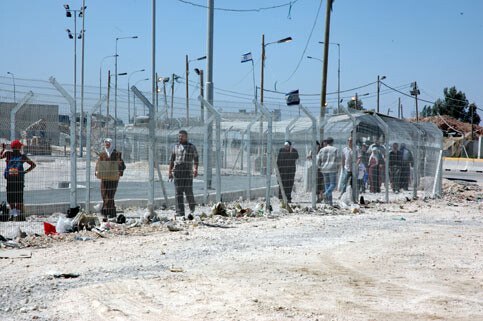The Electronic Intifada 23 November 2005

Palestinians are crossing Qalandia checkpoint through the new wired way which has been built after the closing of the wall within a night, in the West Bank town of Ramallah August 30, 2005. (MAANnews/Charlotte de Bellabre)
One constant in the long conflict over Palestine is that Israel and its backers always have an excuse to avoid the central issues that prevent peace. Israel is adapt at creating complications which then absorb and exhaust all available diplomatic and political energy, while it uses the time to entrench itself ever more deeply in the occupied territories.
By launching his Gaza “disengagement” plan in 2003, Ariel Sharon was able to skilfully exploit the hunger for political distractions that allow diplomats and politicians to appear to be deeply engaged in the “peace process” while actually doing nothing useful. Herds of them rushed to embrace the Gaza plan, which became supposedly the key to unlocking the ‘stalled peace process.’ New cliches were devised for the occasion: pulling out settlers from Gaza would break Israeli psychological taboos and would set a precedent for the West Bank. After all, it was claimed, only hawks can make true peace, as Menachem Begin did with Egypt, or Nixon did in China.
All the open and official talk in Israel that the Gaza disengagement was meant to kill whatever was left of the peace process, rather than advance it, and to put a final end to any Palestinian dream of a state was entirely ignored. Equally ignored were Israeli leaders’ clear declarations that it was pulling settlers out from Gaza primarily because that would allow it to dump responsibility for the 1.4 million Palestinians there and tighten its hold on the West Bank to deal with demographic concerns. As Jewish settlers were melodramatically dragged out of Gaza, Shimon Peres, Israel’s deputy prime minister, explained, “we are disengaging from Gaza because of demography. The desire to maintain a Jewish majority in Israel is seen by most Jewish Israelis as a liberal aspiration, rather than a racist one, as it would appear elsewhere.”
Prior to the “disengagement” it was a fair argument to make that politically-speaking, it was as much as Sharon could do to take almost 8,000 settlers out of Gaza, and that to place additional pressure on him before the Gaza withdrawal would have been futile and possibly counterproductive. But once the settler pullout was complete, then that is the time to test both Israel’s intentions and those of the international community.
It did not take long, however, before it became clear that ‘liberated’ Gaza was, to use the words of Quartet envoy James Wolfensohn, on its way to becoming a “giant prison.” Recently, however, the peace process industry celebrated another “breakthrough,” an agreement to open the border between Egypt and Gaza which has been closed since August. The European Union, once the hope of many Palestinians, has abandoned any pretense that it will challenge Israeli intrasigence or enforce its own laws against Israeli human rights violations. Instead it has inexplicably agreed to provide border guards to control Palestinian entry and exit from Gaza to Egypt, implementing Israel’s instructions exactly as Israel demanded. Following the settler pullout, Israel declared that its border with Gaza is an “international border.” If that is the case, then why should Israel have any role whatsoever in controlling the border between Gaza and Egypt, which should also be an international border free of any Israeli interference? Rather than ending the occupation the agreement simply hides it behind a smiling European face. All of the Gaza venture has been reduced to little more than a wrangle over yet another checkpoint.
Meanwhile, just weeks after the Gaza settler pullout Sharon gave the go ahead for work to start on E-1, a project to double the size of Ma’ale Adumim, already the largest settlement in the West Bank, which when completed rules out any possibility of a contiguous Palestinian state. Dror Etkes, a settlement expert with the group Peace Now said that building in E-1 “is tantamount to standing over the Roadmap and pissing on it.”
The Guardian reported on October 18 that: “[N]ew building on Jewish settlements during the first quarter of this year rose by 83% on the same period in 2004. About 4,000 homes are under construction in Israel’s West Bank colonies, with thousands more homes approved in the Ariel and Ma’ale Adumim blocks that penetrate deep into the occupied territories. The total number of settlers has risen again this year with an estimated 14,000 moving to the West Bank, compared with 8,500 forced to leave Gaza.” Many of those new settlers in the West Bank were simple transferred from Gaza. The paper added that “Israel is also continuing to expand the amount of territory it intends to retain. In July alone, it seized more land in the West Bank than it surrendered in Gaza: it withdrew from about 19 square miles of territory [in Gaza] while sealing off 23 square miles of the West Bank around Ma’ale Adumim.” In September Sharon said that it was important to expand the settlements without drawing the world’s attention. “There’s no need to talk. We need to build, and we’re building without talking,” he said.
As life in Gaza returns to its grim normality, and Israel continues its campaign of extrajudicial executions of Palestinians there and in the West Bank, these hard realities feature nowhere in all the talk about moving towards peace and none of these actions are ever considered crimes or threats to the hudna (truce), which can apparently only be threatened by Palestinian reactions. Attention is set to focus instead on the new distraction of an Israeli general election. UN Secretary General Kofi Annan wasted no time taking all pressure off Israel by declaring on November 21 that, “During this election period, maybe there are certain proposals or issues that cannot be pushed, and things are going to be at a standstill for a while.” Annan was referring to the peace process but of course he did not dare mention that there will be no standstill for the Israeli bulldozers rushing to build new settlements.
Once the Israeli elections are finished, Palestinians will have to be still more patient. Senator Hillary Clinton, the favorite to be the Democratic Party nominee, kicked off the next US presidential campaign with a visit to Jerusalem this month, where she loudly praised the Israeli apartheid wall inside the occupied territories. The first time the world embraced Israel after the Oslo accords were signed in 1993, it was followed by the doubling of the number of settlers in the West Bank. This time again, when it comes to Israel’s openly declared plans, world leaders see nothing, hear nothing, say nothing and have apparently learned nothing. Perhaps they will also pretend to be surprised when, as a result, the violence and misery rises to ever greater heights. Naturally, only the Palestinians will be blamed.
EI contributor Hasan Abu Nimah is the former permanent representative of Jordan at the United Nations. Ali Abunimah is a co-founder of The Electronic Intifada/




